Betta fish, also known as Siamese fighting fish, are one of the most popular types of aquarium fish due to their vibrant colors, unique personalities, and relatively low maintenance needs. However, to keep betta fish healthy and happy, it’s important to maintain proper water conditions, including water temperature. Bettas are tropical fish and prefer warm water that is consistent in temperature.
In this blog post, we will discuss the best temperature for betta fish, how to regulate water temperature, signs of improper water temperature, and answer some common questions about betta fish water temperature. By the end of this post, you’ll have a better understanding of how to maintain the ideal temperature for your betta fish, which will help them thrive and live a long and healthy life.
See also
- Do Betta Fish Change Color: 4 Most Common Reasons
- Why Betta Fish Staying At Top Of Tank & The Best Solutions For It
- Do Betta Fish Like Light? Your Answer Is Right In This Post!
Ideal Water Temperature For Betta Fish
The ideal water temperature range for betta fish is between 76 and 82 degrees Fahrenheit (24-28 degrees Celsius).
This betta water temperature range is ideal for betta fish because they are native to tropical regions where the water temperature is warm and consistent. At this temperature range, betta may maintain their metabolic rate, digestion, and immune system, as well as exhibit their natural behaviors and vibrant colors. In addition, consistent betta fish temperature helps to reduce stress in betta fish, which is important for their overall health and well-being. It’s important to note that sudden changes in water temperature can be harmful to betta fish, so maintaining a consistent water temperature within the ideal range is essential.
Factors That Affect Betta Fish Water Temperature
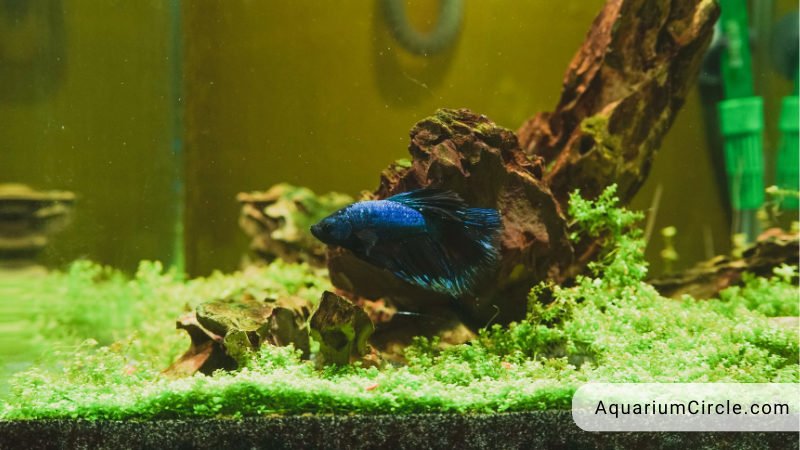
Several factors can affect the water temperature in a betta fish tank, and it is important to understand them to keep your fish healthy and happy.
One factor that can affect the water temperature is the temperature of the room where the tank is located. During colder months, the average room temperature may be cooler, which can cause the water temperature in the tank to drop. In contrast, during warmer months, the temperature in the room may be warmer, which can cause the water temperature in the tank to rise. Therefore, it’s important to keep the tank in a room with a consistent temperature to maintain a stable water temperature.
The size of the betta fish tank can also affect the water temperature. Smaller tanks may have more significant temperature fluctuations than larger tanks, so it’s essential to monitor the temperature closely and make adjustments as necessary. Generally, larger tanks are more stable in terms of temperature, making it easier to maintain a consistent water temperature.
Lighting is another factor that can affect the betta fish temperature range. Aquarium lighting can heat the water, which can raise the water temperature. It’s important to monitor the water temperature regularly and adjust the aquarium lighting as needed to ensure that it does not affect the water temperature.
A malfunctioning aquarium water heater can also cause the water temperature to fluctuate, which can be harmful to betta fish. Regular maintenance and monitoring of the heater can help prevent this from happening.
Lastly, water changes can also affect the water temperature in the betta fish tank. It’s important to use water that is the same temperature as the tank water when performing water changes to avoid sudden temperature changes. Gradual changes in temperature are less stressful for betta fish and help maintain a stable environment.
Do Betta Fish Need A Heater?
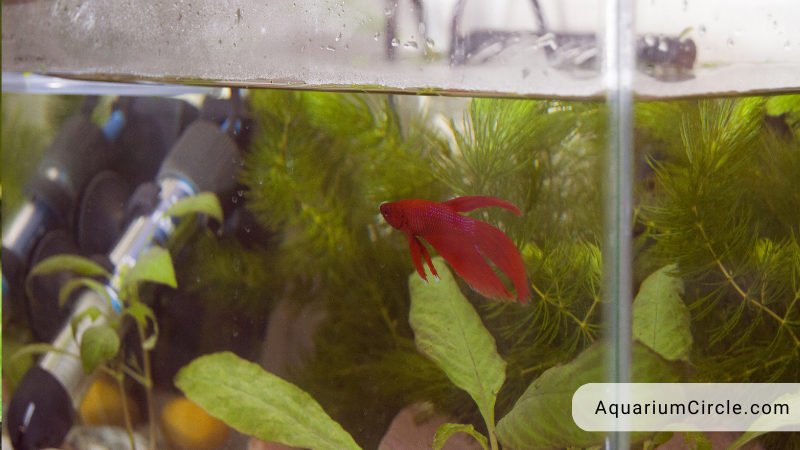
Yes, betta fish need a heater in their tank. This is because betta fish are tropical fish and require a consistent water temperature between 76 and 82 degrees Fahrenheit (24-28 degrees Celsius) to maintain their metabolic rate, digestion, and immune system. In addition, consistent water temperature helps reduce stress in betta fish, which is essential for their overall health and well-being.
Without a heater, the water temperature in the tank can fluctuate, which can be harmful to betta fish. Sudden changes in water temperature can cause stress, weaken their immune system, and make them susceptible to diseases. A heater in the tank ensures that the water temperature remains stable and within the ideal range for betta fish.
When selecting a heater to keep your betta tank temperature stable, it’s important to choose one that is appropriate for the size of the tank and is adjustable. An adjustable heater allows you to set the temperature to the desired range, ensuring that it remains consistent. It’s also important to monitor the water temperature regularly and make adjustments as necessary to ensure that it remains within the ideal range for your betta fish.
How To Keep A Betta Fish Water Temp Warm Without A Heater?
Maintaining the ideal temperature for betta fish is crucial for its health and well-being. Although it’s not recommended, there are ways to keep the water temperature warm in an emergency if you don’t have or use a heater.
One of the easiest ways to raise the water temperature is to increase the temperature of the room where the betta fish tank is located. You can do this by keeping the tank in a warm room or using a space heater or a room heater to raise the room temperature. However, it’s important to note that changes in room temperature can be difficult to control, and it may not be possible to maintain a consistent temperature range for your betta fish.
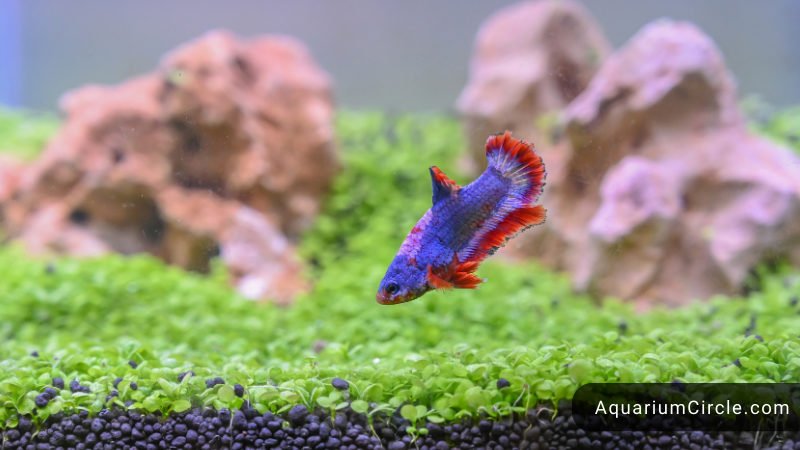
Another way to keep the water temperature warm is to use a warm water bottle outside the fish tank. By placing a warm water bottle close to the tank, you can help to raise the temperature of the surrounding air, which can help keep the water temperature warm. However, it’s crucial to monitor the water temperature regularly to ensure it remains within the safe range.
If you have a heat lamp, you can also use it to keep the water temperature warm. A heat lamp provides warmth to the surroundings, which can help raise the water temperature in the tank. However, it’s important to position the heat lamp at a safe distance from the tank to avoid overheating and monitor the water temperature regularly.
Lastly, you can cover the betta fish tank with a blanket or towel to help insulate the tank and keep the water temperature warm. This method can help to retain heat, but it’s important to monitor the water temperature regularly to ensure it remains within the safe range.
It’s important to note that while these methods can help to raise the water temperature in an emergency, they are not a long-term solution. A heater is the best way to maintain a consistent and safe temperature range for your betta fish tank. Therefore, it’s recommended to invest in a good-quality aquarium heater to ensure the health and well-being of your betta fish.
Signs Of Improper Water Temperature In Betta Fish Tank
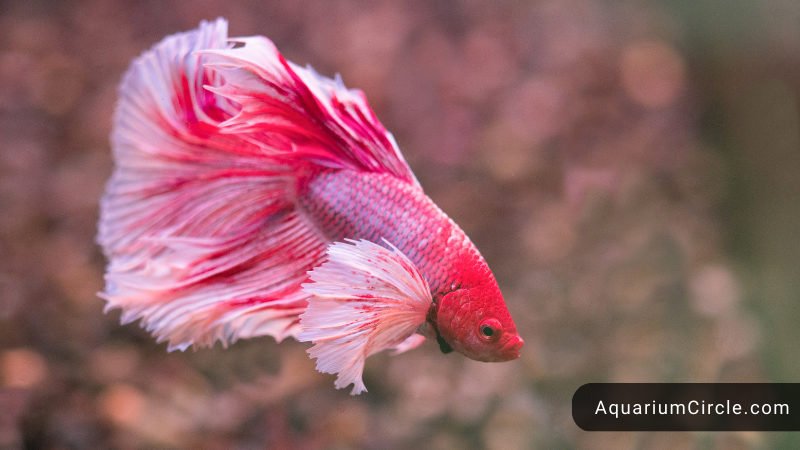
Betta fish are sensitive creatures, and their health and well-being depend on many factors, including water temperature. If the water temperature in their tank is not within the ideal range, it can cause them to experience stress and fish diseases that can be life-threatening. As a responsible pet owner, it’s crucial to keep an eye out for the signs of improper water temperature and take necessary steps to address the issue.
One of the most common signs of improper water temperature in betta fish is lethargy. If you notice that your betta fish is spending more time than usual at the bottom of the tank, it may be a sign of stress caused by sudden changes in temperature. Betta fish are naturally active and energetic, so if they’re spending most of their time resting, it could be a warning sign that something is wrong.
Another sign of improper water temperature in betta fish is loss of appetite. When the water temperature is too high or too low, betta fish may stop eating or eat less than usual. Changes in temperature can also cause digestive issues like bloating and constipation, which can further reduce their appetite.
Rapid breathing or gasping for air is another indication that your betta fish may be experiencing stress due to improper water temperature. High water temperatures can cause a decrease in oxygen levels, while low water temperatures can slow down their metabolism, leading to respiratory problems. It’s essential to keep the water temperature within the ideal range to prevent such issues.
Improper water temperature can also weaken the immune system of betta fish, making them more susceptible to diseases such as fin rot. Fin rot is a bacterial infection that can cause the fins of the fish to deteriorate and fall off. If you notice any changes in the appearance of your betta fish’s fins, it’s crucial to check the water temperature and take necessary steps to correct it.
Last but not least, erratic swimming behavior is another sign of improper water temperature. Betta fish may swim erratically or dart around the tank when the water temperature is too high or too low. This behavior can be a sign of stress and discomfort, and it’s essential to address the issue to prevent further harm.
See also: Healthy Betta Fish Vs Unhealthy: 9 Signs You Must Notice Before Your Pet Dies
How To Keep The Perfect Water Temperature In The Betta Tank?
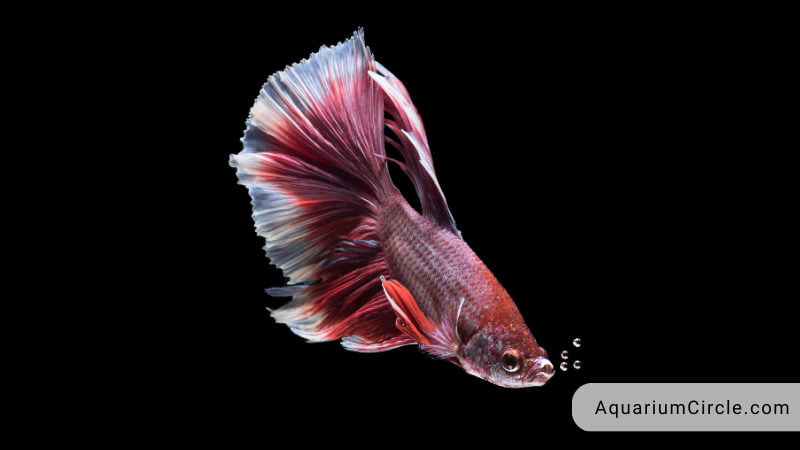
Keeping the perfect water temperature in a betta fish tank is crucial for the health and well-being of your fish. Here are some tips on how to maintain the ideal water temperature in your betta fish tank:
- Invest in a good-quality aquarium heater: One of the most important things you can do to maintain the perfect water temperature in your betta fish tank is to invest in a high-quality aquarium heater. Look for a heater that is specifically designed for small aquariums, and make sure it has a thermostat to help you regulate the water temperature.
- Use a thermometer: A thermometer is an essential tool for monitoring the water temperature in your betta fish tank. Place the thermometer in the water, and make sure it’s visible and easy to read. Keep an eye on the temperature to ensure that it remains within the ideal range.
- Set the temperature gradually: When you first install your aquarium heater, it’s essential to set the temperature gradually. Sudden changes in water temperature can stress out your fish, so start by setting the temperature a few degrees above or below the current temperature and adjust it gradually over several hours.
- Check the temperature regularly: Once you’ve set the temperature in your betta fish tank, it’s crucial to monitor it regularly to ensure that it remains within the ideal range. Check the temperature at least once a day and make adjustments as necessary.
- Avoid placing the tank near windows or drafts: It’s essential to keep your betta fish tank away from direct sunlight or drafts, as this can cause fluctuations in water temperature. Place the tank in a location that’s out of direct sunlight and away from windows and doors.
In conclusion, maintaining the perfect water temperature in your betta fish tank requires a combination of a good-quality aquarium heater, a thermometer, and regular monitoring. By following these tips, you can ensure that your betta fish will become healthy, happy, and free from stress and illness.
What Happens If The Water In Your Betta Fish Aquarium Is Too Hot?
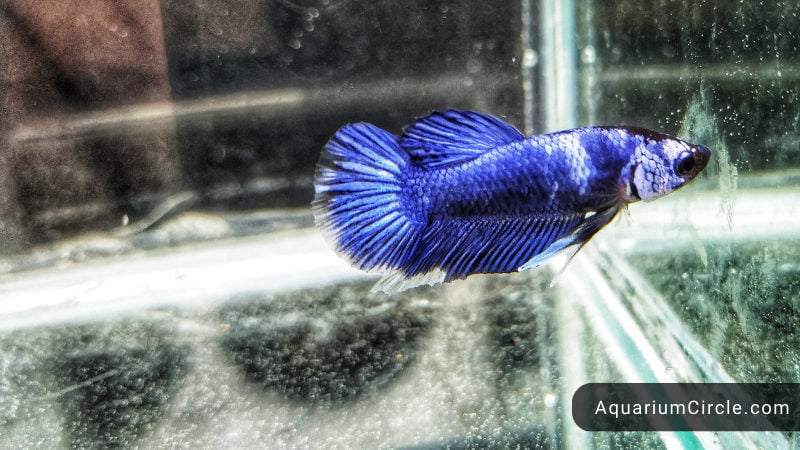
If the water in your betta fish aquarium is too hot, it can have a negative impact on the health and well-being of your fish. Here are some of the consequences of having water that is too hot in your betta fish tank:
- Stress: Betta fish are sensitive to changes in water temperature, and sudden changes or fluctuations in temperature can cause them to experience stress. If the water is too hot, it can cause your betta fish to become stressed and agitated.
- Oxygen depletion: Warm water has less oxygen than cooler water, and if the water temperature is too high, it can cause oxygen levels to drop, which can be harmful to your betta fish. If the water temperature is too high, your betta fish may start to gasp for air at the surface of the water.
- Bacterial growth: High water temperatures can create a favorable environment for the growth of harmful bacteria, which can lead to infections and other health issues for your betta fish.
- Metabolic rate: When the water temperature is too high, it can cause your betta fish’s metabolic rate to increase. This can cause them to become more active and hungry, which can lead to overfeeding and digestive problems.
- Death: If the water temperature remains too high for an extended period, it can be fatal for your betta fish. Prolonged exposure to high temperatures can cause them to become lethargic, lose their appetite, and ultimately lead to death.
Therefore, it’s important to monitor the water temperature regularly and ensure that it remains within the safe temperature range for your betta fish. If you notice that the water temperature is too high, take immediate action to cool down the water and ensure the health and well-being of your betta fish.
What Happens If The Water Is Too Cold?

If the water in your betta fish aquarium is too cold, it can also have a negative impact on the health and well-being of your fish. Here are some of the consequences of having water that is too cold in your betta fish tank:
- Sluggishness: Betta fish are tropical fish, and they are used to living in warm water. If the water temperature is too cold, your betta fish may become sluggish, and their movements may slow down.
- Decreased immune function: Cold water can weaken your betta fish’s immune system, making them more susceptible to diseases and infections.
- Digestive problems: Cold water can also slow down your betta fish’s digestion, which can lead to constipation and other digestive problems.
- Increased susceptibility to illness: When the water temperature is too cold, your betta fish is more vulnerable to illnesses, including bacterial and fungal infections.
- Death: If the water temperature remains too cold for an extended period, it can be fatal for your betta fish. Prolonged exposure to cold temperatures can cause your betta fish to become lethargic, lose their appetite, and ultimately lead to death.
Therefore, it’s important to monitor the water temperature regularly and ensure that it remains within the safe temperature range for your betta fish. If you notice that the water temperature is too cold, take immediate action to warm up the water and ensure the health and well-being of your betta fish.
See also: Is Your Betta Fish Sleeping Or Dead? Advice Of An Aquarium Enthusiast
What Exactly Is Temperature Shock?

Temperature shock, also known as thermal shock, is a sudden and drastic change in water temperature that can have harmful effects on fish, including betta fish. Temperature shock can occur when there is a sudden change in the water temperature due to a variety of factors, such as turning on a heater or air conditioner, adding cold water to the tank, or changing the water during a water change.
When betta fish are exposed to rapid temperature changes, their bodies can experience physiological stress, which can weaken their immune system and make them more vulnerable to diseases and infections. In severe cases, temperature shock can cause betta fish to go into shock and die.
It’s important to take steps to prevent temperature shock by avoiding sudden changes in water temperature. If you need to change the water temperature, do so gradually over several hours to give your betta fish time to adjust. It’s also important to regularly monitor the water temperature and make sure that it remains within the safe temperature range for your betta fish. By taking these precautions, you can help ensure the health and well-being of your betta fish and prevent temperature shock from occurring.
Video About Betta Fish Water Temp
FAQs
Is 26 degrees hot for betta fish?
No, 26 degrees Celsius is within the ideal betta temperature range for betta fish, which is between 24-28 degrees Celsius. Therefore, it is not too hot for betta fish.
Is 70 degrees too cold for a betta?
Yes, 70 degrees Fahrenheit is too cold for a betta fish as it falls outside of the ideal water temperature range, which is between 76-82 degrees Fahrenheit. Betta fish may become stressed, more prone to disease, and even go into a state of torpor if the water temperature is too cold.
Do Bettas prefer warm or cold water?
Betta fish prefer warm water as they are native to tropical regions and require a consistent water temperature between 76-82 degrees Fahrenheit (24-28 degrees Celsius) for optimal health and well-being.
References

Annette M. Chaney is an experienced marine biologist with over 20 years of experience as an aquarist and fishkeeper. She started her first aquarium at a young age, filling it with frogs and goldfish obtained from the ten-cent pet store.
Annette grew up caring for and breeding African Cichlids, which led to a hobby in high school that doubled as a profitable means. Attending Reed College gave her time to solidify herself as an accomplished aquarium caretaker with an eye for sales. After that, from 2009 – 2013, she studied at Roger Williams University – one of the most prestigious universities for Aquaculture and Aquarium in USA. She is the founder of AquariumCircle since 2010.
